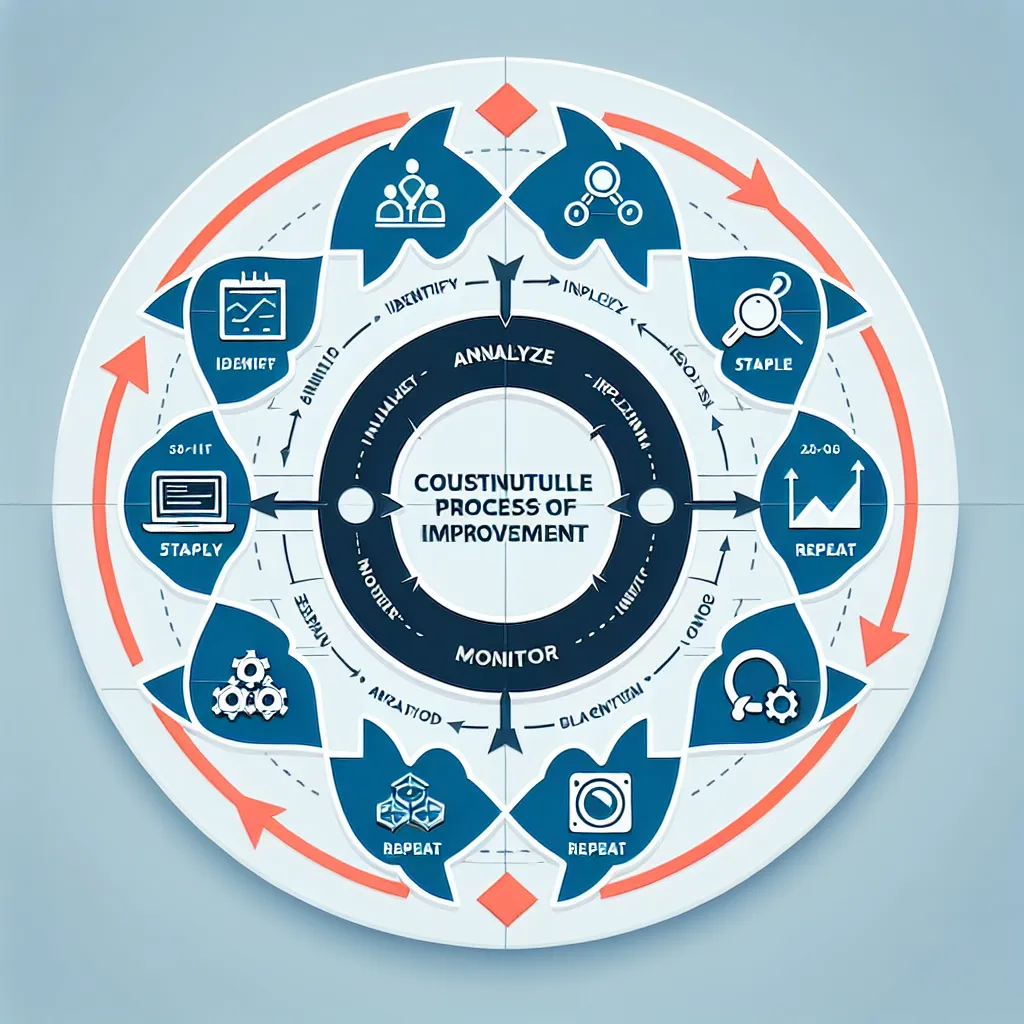Process improvement is a crucial skill in today’s fast-paced business environment. When interviewing for a position that requires this expertise, it’s essential to articulate your experience effectively. This article will guide you through explaining your process improvement experience in a way that impresses potential employers.
Understanding Process Improvement
Process improvement refers to the identification, analysis, and improvement of existing business processes to optimize performance, meet best practice standards, or simply improve quality and user experience. It’s a systematic approach to making organizational processes more efficient and effective.
 Process Improvement Cycle
Process Improvement Cycle
Why Process Improvement Matters to Employers
Employers value candidates with process improvement experience because:
- It demonstrates analytical thinking
- It shows initiative and proactivity
- It can lead to cost savings and increased efficiency
- It indicates an understanding of business operations
Preparing to Discuss Your Process Improvement Experience
Before your interview, reflect on your past experiences with process improvement. Consider projects where you:
- Identified inefficiencies in a workflow
- Implemented new technologies or methodologies
- Reduced costs or time spent on a process
- Improved customer satisfaction through streamlined processes
Structuring Your Response
When explaining your experience, use the STAR method:
- Situation: Describe the context of the process improvement project
- Task: Explain your specific role and objectives
- Action: Detail the steps you took to improve the process
- Result: Quantify the outcomes and benefits of your improvements
Example Response
“In my previous role as an Operations Analyst at XYZ Company, I noticed that our customer service response time was lagging. The average response time was 48 hours, which was leading to customer dissatisfaction.
I took the initiative to analyze our current process and identified several bottlenecks. I proposed and implemented a new ticketing system that categorized inquiries by urgency and type. I also developed a set of response templates for common issues.
As a result of these changes, we reduced our average response time to 12 hours, increased customer satisfaction ratings by 35%, and improved our team’s efficiency by 40%.”
Common Interview Questions on Process Improvement
Here are some questions you might encounter, along with tips on how to answer them:
-
“Can you describe a time when you improved a process at work?”
- Focus on a significant improvement with measurable results
- Explain your thought process and the steps you took
-
“What tools or methodologies do you use for process improvement?”
- Mention specific methodologies like Six Sigma, Lean, or Kaizen
- Discuss any software tools you’re proficient in, such as Visio or Lucidchart
-
“How do you identify areas for improvement in a process?”
- Talk about data analysis, observation, and gathering feedback from stakeholders
- Emphasize your ability to see the big picture while also paying attention to details
-
“How do you handle resistance to change when implementing process improvements?”
- Discuss your communication and change management skills
- Provide an example of how you’ve successfully managed stakeholders during a change process
-
“What was the most challenging process improvement project you’ve worked on, and how did you overcome the challenges?”
- Choose a project that showcases your problem-solving skills and perseverance
- Highlight the lessons learned and how they’ve made you a better professional
Avoiding Common Mistakes
When discussing your process improvement experience, avoid these pitfalls:
- Being vague: Always provide specific examples and quantifiable results
- Claiming sole credit: Acknowledge team efforts and your role within them
- Overlooking failures: Be prepared to discuss projects that didn’t go as planned and what you learned
- Neglecting the human element: Remember to mention how you managed people through the change process
Advanced Tips for Experienced Candidates
If you have extensive experience with process improvement, consider these advanced strategies:
- Discuss long-term impacts: Explain how your improvements affected the organization beyond immediate results
- Highlight cross-functional projects: Demonstrate your ability to work across departments
- Mention any certifications: If you have relevant certifications like Six Sigma Black Belt, be sure to bring them up
- Talk about mentoring: If you’ve trained others in process improvement, share these experiences
 Process Improvement Team Meeting
Process Improvement Team Meeting
Follow-up Questions and Sample Answers
Here are some potential follow-up questions with suggested responses:
-
“How do you measure the success of a process improvement initiative?”
- Sample answer: “I believe in setting clear, measurable KPIs before implementing changes. These might include time saved, cost reduction, or improvement in quality metrics. I also conduct regular check-ins and gather feedback from users to ensure the improvements are effective and sustainable.”
-
“Can you explain how you’ve used data analysis in process improvement?”
- Sample answer: “In my last project, I used both qualitative and quantitative data. I conducted time studies, analyzed error rates, and used statistical tools to identify patterns. This data-driven approach helped me pinpoint the root causes of inefficiencies and develop targeted solutions.”
-
“How do you prioritize which processes to improve?”
- Sample answer: “I prioritize based on the potential impact and alignment with organizational goals. I look at factors like customer impact, cost-saving potential, and how critical the process is to core operations. I also consider the effort required versus the expected benefits to ensure we’re focusing on high-value improvements.”
-
“Have you ever had to abandon a process improvement project? Why?”
- Sample answer: “Yes, there was an instance where we started a project to automate part of our supply chain. However, after initial implementation, we realized that the cost of maintaining the new system outweighed the benefits. We made the tough decision to revert to the old process but applied some of the learnings to make smaller, more cost-effective improvements.”
-
“How do you stay updated on new process improvement methodologies and tools?”
- Sample answer: “I’m committed to continuous learning. I regularly attend industry conferences, participate in webinars, and am part of several professional networks focused on process improvement. I also read industry publications and experiment with new tools in small-scale projects to evaluate their potential.”
Conclusion
Explaining your experience with process improvement is an opportunity to showcase your analytical skills, initiative, and ability to drive positive change within an organization. By preparing specific examples, quantifying your results, and demonstrating your understanding of various improvement methodologies, you’ll position yourself as a valuable asset to any potential employer.
Remember to tailor your responses to the specific role and company you’re interviewing with, and always be ready to provide additional details or examples. With these strategies, you’ll be well-equipped to discuss your process improvement experience confidently and effectively in your next interview.
For more interview tips and strategies, check out our article on how to talk about your approach to meeting deadlines, which can complement your process improvement skills nicely.




